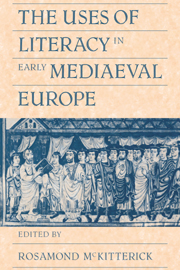Book contents
- Frontmatter
- Contents
- List of illustrations
- Contributors
- Preface
- Abbreviations
- Introduction
- 1 Literacy in Ireland: the evidence of the Patrick dossier in the Book of Armagh
- 2 Anglo-Saxon lay society and the written word
- 3 Administration, law and culture in Merovingian Gaul
- 4 Literacy and the papal government in late antiquity and the early middle ages
- 5 Literacy and the laity in early mediaeval Spain
- 6 Aspects of mediaeval Jewish literacy
- 7 Writing in early mediaeval Byzantium
- 8 Literacy displayed: the use of inscriptions at the monastery of San Vincenzo al Volturno in the early ninth century
- 9 Royal government and the written word in late Anglo-Saxon England
- 10 Literacy in Carolingian government
- 11 Text and image in the Carolingian world
- Conclusion
- Index
7 - Writing in early mediaeval Byzantium
Published online by Cambridge University Press: 07 December 2009
- Frontmatter
- Contents
- List of illustrations
- Contributors
- Preface
- Abbreviations
- Introduction
- 1 Literacy in Ireland: the evidence of the Patrick dossier in the Book of Armagh
- 2 Anglo-Saxon lay society and the written word
- 3 Administration, law and culture in Merovingian Gaul
- 4 Literacy and the papal government in late antiquity and the early middle ages
- 5 Literacy and the laity in early mediaeval Spain
- 6 Aspects of mediaeval Jewish literacy
- 7 Writing in early mediaeval Byzantium
- 8 Literacy displayed: the use of inscriptions at the monastery of San Vincenzo al Volturno in the early ninth century
- 9 Royal government and the written word in late Anglo-Saxon England
- 10 Literacy in Carolingian government
- 11 Text and image in the Carolingian world
- Conclusion
- Index
Summary
On 18 (or 12) July 836 the brothers Theodore and Theophanes, forever afterwards to be described as the Graptoi (the inscribed), were interrogated by the Iconoclast emperor Theophilos.
But when the saints remained silent, returned no answer, and bent their heads towards the ground, the Emperor said to his Prefect, ‘Take away these impious men and tattoo their foreheads, inscribing these iambics, and hand them over to two of the sons of Hagar, that they may conduct them to their own country.’ Near the Emperor there stood a man named Christodoulou who had composed the iambics and who had them at hand. The Emperor commanded him to read them aloud in the hearing of all and he added, ‘Even if they are badly composed, never mind.’ He said this, knowing how excellently they themselves practised accuracy in poetical composition, and how much they would be ridiculed by the champions of Christ. One of those present, wishing to please the Emperor, said, ‘But they are not worthy, O Lord, of better iambics.’
This passage epitomizes a view of Byzantine literacy widely current among both Byzantinists and western mediaevalists, of the supreme power of the written word, and of the ability of the Byzantines to appreciate it. Here, at least, the classical tradition was not dead, where simple monks could be shamed by the quality of versification of their tormentors, composed by a layman-about-court. Whatever the vicissitudes of literacy in the states which succeeded the Roman Empire in the west, Byzantium offers a clear foil of continuity in literary production and education, and of widespread lay, even female, literacy.
- Type
- Chapter
- Information
- The Uses of Literacy in Early Mediaeval Europe , pp. 156 - 185Publisher: Cambridge University PressPrint publication year: 1990
- 5
- Cited by



